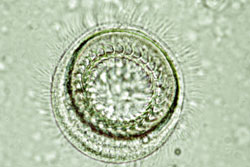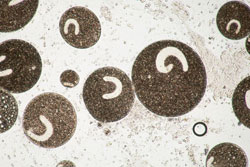Maintaining Healthy Murray Cod
Brett Ingram, Snobs Creek
May 2007
FN0598
ISSN 1448-7373

Embracing the old adages "that prevention is better than cure" and "to be forewarned is to be forearmed", Department of Primary Industries (DPI) scientists and The Victorian Fisheries Authority have produced a practical manual which describes the activities Murray cod farmers should undertake to keep their stock disease-free.
Farming Murray cod to produce high-quality table fish for domestic and export markets is a rapidly emerging agribusiness sector in Victoria. The expansion of the industry has been largely due to development of intensive recirculating aquaculture system (RAS) technology that supports higher stocking densities and faster growth rates than conventional open systems (e.g. pond) and allows farmers to produce market-size fish within one year.
Recirculating aquaculture systems allow farmers to manage the culture environment to meet the optimal requirements of the cultured species and provide a measure of protection from the external environment. No aquaculture production system is completely isolated from the external environment and disease outbreaks can occur.
Disease outbreaks can cause heavy stock mortality, reduce growth rates of stock, render fish unsuitable for market and cause significant economic losses for farmers. On regional and national scales, disease outbreaks can constrain industry development. With proper management, the risk of a disease outbreak in stock can be reduced.
External water supplies that are habitat for aquatic animals
(e.g. lakes, streams or rivers) and stock purchased from other aquaculture facilities are major sources of disease risk in RASs. Poor husbandry practices and activities that induce stress in stock (e.g. overfeeding, poor water quality, improper handling of stock, poor facility hygiene) can also increase the likelihood of disease outbreaks. Critical to maintaining Murray cod health is maintaining water quality within the range suitable for the species.

To ensure sustainable growth and production in the Murray cod far ming industry, it is essential that farmers are familiar with the common diseases, and conditions that affect the health of their stock. They should employ sound management strategies to reduce the incidence and severity of factors affecting fish health.
To provide farmers with information about stock health checks and the signs and symptoms that can provide early warning of disease, DPI has published Fish Health Management Guidelines for Farmed Murray Cod. Practical advice on recognising and treating diseases caused by viruses, bacteria, parasites and fungus (some examples are shown below), inappropriate or imbalanced nutrition, inadequate husbandry practices and poor water quality is provided.
- active management of stock health,
- maintaining hygienic conditions within the aquatic environment and the facility,
- disinfecting inlet water,
- regular monitoring of water quality,
- obtaining health certification for new stock,
- quarantining of new stock from other animals,
- minimising or modifying activities that cause unnecessary stress in stock, and
- feeding stock an appropriate diet
According to DPI aquaculture scientist Brett Ingram, "...actively removing factors which cause stress to the fish – whether it be from inappropriate food, inappropriate water quality, the presence of parasites or a disease – Murray cod farmers will improve their production rates and quality of their produce. Like people, healthy and happy fish perform better!!" Fish Health Management Guidelines for Farmed Murray Cod includes a decision support flow-chart to help farmers proactively manage their stock and quickly identify and rectify common health problems.
Further Information
For more information about Fish Health Management Guidelines for Farmed Murray Cod, please contact Brett Ingram at PIRVic Snobs Creek (03) 5770 8029.
